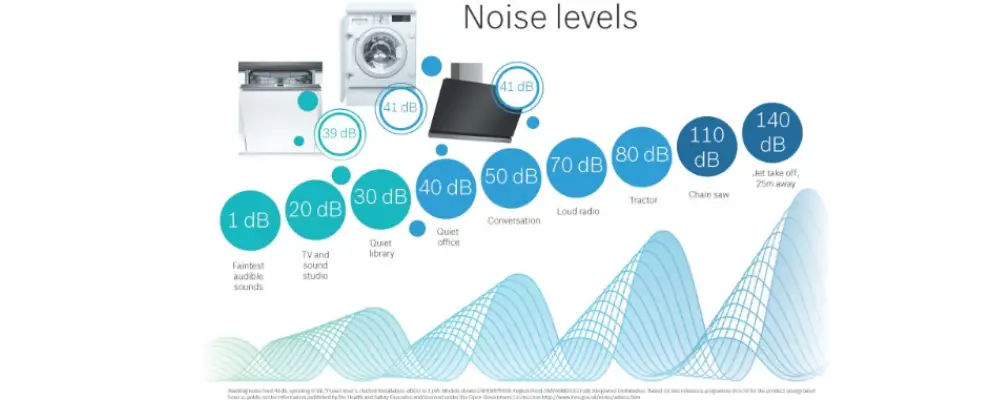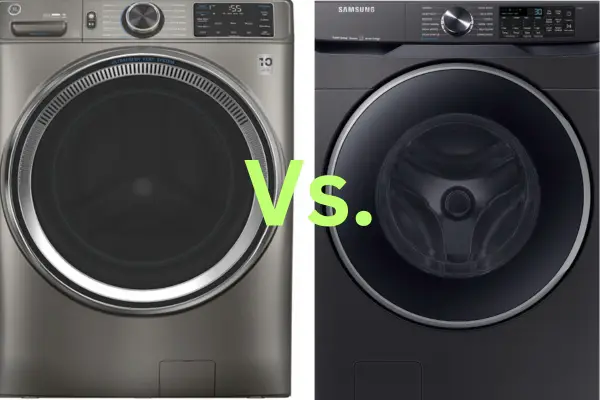General Electric (GE) and Samsung are like the cool kids in the electronic appliances world. They’re famous for being excellent in quality, lasting power, efficiency, and not too hard on the pocket.
Deciding which one makes the best washers can be a bit tricky. It’s like comparing apples and oranges (each has its own strengths). General Electric (GE) rocks it in some areas, while Samsung shines in others. It’s all about finding the right fit for what you need!
But don’t worry! This article is here to help you out. It’s got all the answers to your questions and is designed to steer you in the right direction so you can make an intelligent choice when picking the perfect washer for your needs.
Deciding between GE and Samsung washers depends on what you care about most. GE is great because it’s cheaper, saves space, has a giant detergent dispenser, and is energy-efficient. But if you want a reliable, roomy, and fast washer with lots of wash options and a good warranty, Samsung is a solid choice.
GE vs. Samsung Washer Comparision
Here is a table summarizing the critical comparisons between GE and Samsung washers,
| Aspect | GE | Samsung | Verdict |
|---|---|---|---|
| Reliability | Fewer service centers, harder to find parts | Wider service network, readily available parts | Samsung is more reliable |
| User Friendliness | Simple controls, robust online support | Rich feature set, may be overwhelming | Samsung is more user-friendly |
| Washer Size | Less spacious (up to 5.3 cu-ft.) | More spacious options (up to 6.0 cu-ft.) | Samsung for larger laundry rooms |
| Washer Weight | Marginally lighter | Slightly heavier | GE is more portable |
| Washing Speed | Averages 60 minutes | Averages 28-30 minutes (Super-Speed tech) | Samsung is quicker |
| Mold Prevention | OdorBlack fan, Microban surface | Self-cleaning cycles, antibacterial materials | GE’s tech is more dependable |
| Aesthetics | Modern and sleek | Aesthetically pleasing, glass doors | Both are stylish |
| Affordability | More budget-friendly options | Budget-friendly choices available | GE is more budget-friendly |
| Auto Dispenser Size | Larger capacity (up to 32 loads) | Smaller than GE | GE is the winner |
| Noise Levels | Generally quieter | Quiet operation, reduced vibration | GE is slightly quieter |
| Energy Efficiency | Energy-efficient, some with ENERGY STAR ratings | Energy-efficient, ENERGY STAR ratings | Both prioritize energy efficiency |
| Warranty Coverage | One year full, ten years motor | One year full, 3-5 year extended, 5-20-year motor | Samsung is the clear winner |
Detailed Comparision between LG and Samsung Washer
Now that I’ve outlined the main differences between these two industry giants, let’s dive deeper into a detailed comparison.
1. Reliability
Reliability is a critical factor when choosing the right washer for your household. It influences the longevity and consistent performance of the appliance.

GE washers face reliability challenges due to fewer service centers and potential difficulties finding replacement parts. This can be concerning, as quick servicing and accessible parts are vital for a reliable appliance.
In contrast, Samsung positions itself as a more reliable option. With a broader service network and readily available parts, Samsung addresses common concerns related to reliability. The brand’s commitment to accessibility and service availability makes its washing machines more dependable.
Therefore, Samsung is the clear winner in reliability over GE. Its superior service and wider network enhance overall washer reliability. Also, ranked number 1 by J.D Power for four years. Samsung also leads in customer satisfaction per ACSI (American Consumer Satisfaction Index)
2. User Friendliness
Simplicity often beats complexity, so I personally value a washer that’s easy to use. Both washers have simple cycle selectors, one-touch controls, and sound displays.

GE positions itself as a user-friendly option by offering straightforward controls and robust online support. The emphasis on simplicity aims to provide users with an intuitive and hassle-free experience, making laundry tasks more manageable.
Despite boasting a potentially overwhelming feature set, Samsung distinguishes itself by being deemed more user-friendly. The brand achieves a delicate balance between advanced features and ease of use, ensuring that the abundance of functionalities does not compromise the overall usability of the washer.
In terms of user-friendliness, Samsung takes the lead. Their commitment to simplicity, comprehensive user experience, and a balanced approach to features make their washers more accommodating and user-friendly compared to GE
3. Washer Size
Regarding washer dimensions, both GE and Samsung offer a range of choices. Standard full-size GE washers typically possess a width of 28 inches, while Samsung counterparts are generally 27 inches wide, indicating a slight disparity in size.

GE washers are known for efficiency and feature compact designs, making them well-suited for more minor laundry requirements. The focus here is on functionality and effectiveness, catering to households with moderate laundry needs.
GE top-loaders typically boast capacities ranging from 2.8 to 5.3 cubic feet.
In contrast, Samsung offers larger capacity options, addressing a broader spectrum of laundry demands. This characteristic renders Samsung washers ideal for those with more extensive laundry spaces or households that frequently contend with substantial loads.
Samsung’s models range from 4 to 5.5 cubic feet.
| Washer Type | GE Washer | Samsung Washer |
|---|---|---|
| Top Load | 2.8-5.3 cu-ft. | 4.0-5.5 cu-ft. |
| Front Load | 2.4-5.3 cu-ft. | 2.2-6.0 cu-ft. |
With its versatile and spacious options, Samsung surpasses GE in washer size, making it the ideal choice for larger laundry needs.
While GE serves well for smaller loads, Samsung stands out for those seeking efficiency and flexibility in managing substantial laundry tasks, showcasing a commitment to diverse consumer needs.
4. Washer Weight
Beyond the functional aspects of washing performance, the weight of a washer can significantly impact its maneuverability and ease of relocation within a household.

GE washers tend to be slightly heavier, a standard top-loading GE washer weighs around 45 to 50 kilograms. While this weight may signify sturdiness and stability during operation, it may also impact the overall portability of the appliance.
On the other hand, Samsung washers are characterized by being marginally lighter in weight, i.e., 41 Kg. This characteristic enhances portability, making it more convenient for users to move the appliance.
Therefore, there is no clear winner in this category. It depends on whether you want a sturdy or portable washer.
5. Washing Speed
When it comes to laundry, saving time is crucial for busy users. How fast a washing machine can finish its cycles is a key factor in choosing one that aligns with a quick and efficient lifestyle.

With an average cycle time of 60 minutes, GE washers adhere to a standard washing speed. This may suit users with more conventional needs and timeframes for completing laundry tasks.
Leveraging its Super-Speed technology, Samsung washers redefine washing speed with cycles between 28-30 minutes. This innovative approach aims to significantly reduce the time spent on laundry without compromising cleaning performance.
Regarding washing speed, Samsung leads the way with its Super-Speed technology, completing cycles in less than half the time of GE washers. This makes Samsung the preferred choice for those prioritizing time efficiency in their laundry routines.
6. Mold Prevention
Keeping your washing machine clean is vital for longevity and ensuring your laundry stays fresh. Mold prevention is crucial in maintaining overall cleanliness and promoting a safe wash.

GE addresses mold prevention by employing an OdorBlack fan and a Microban surface. These features work in tandem to inhibit mold and bacteria growth, contributing to a cleaner washer.
Samsung takes a comprehensive approach to mold prevention, incorporating self-cleaning cycles and antibacterial materials. This dual-pronged strategy ensures not only the prevention of mold but also the maintenance of a hygienic washing environment.
When it comes to mold prevention, Samsung takes the lead. Their incorporation of CleanGuard antibacterial technology, which eliminates up to 99% of microorganisms, including mold, is very effective.
7. Aesthetics
Personal preferences play a significant role in liking a design or the materials used, but generally speaking,
GE: GE washers are characterized by a modern and sleek design. The emphasis on contemporary aesthetics aims to provide users with a visually appealing appliance that seamlessly integrating into modern living spaces.
Samsung: Samsung elevates its design with aesthetically pleasing glass doors, enhancing the overall appeal of its washers. This focus on design aesthetics adds a touch of sophistication to the appliance.
In evaluating aesthetics, both GE and Samsung emerge as stylish contenders.
8. Affordability
Affordability is a paramount factor for me when choosing a washer. I prioritize price over aesthetics or other features. GE and Samsung generally offer budget-friendly options, with washers for under $1,000.

However, Samsung washers are usually more expensive than GE. Here is a table for quick price comparison,
| Washer Type | GE | Samsung |
| Top Load | $512-$999 | $599-$1,169 |
| Front Load | $779-$1,999 | $649-$3,157 |
9. Dispenser Size
When it comes to detergent usage, it varies from person to person. Some prefer using less detergent to prolong the life of their clothes, while others opt for larger quantities for a deeper clean.

However, GE washers showcase a notable advantage, providing larger auto dispensers that accommodate up to 32 loads. This generous capacity contributes to greater convenience for users who prefer fewer refills.
In contrast, Samsung washers feature smaller auto dispensers, potentially requiring more frequent refills. The reduced capacity may impact the overall efficiency of the dispensing process.
But as I said, it’s not a very important feature; therefore, I consider it not too important in choosing a washer.
10. Noise Levels
The acoustic profile of a washing machine can significantly impact the overall user experience, especially in households where laundry areas are near living spaces.

GE washers are generally characterized by quieter operation. The emphasis on minimizing noise contributes to a more peaceful laundry environment, especially in homes where noise may be a concern.
Samsung washers also prioritize quiet operation by incorporating features that reduce vibration.
However, GE stands out in evaluating noise levels as the slightly quieter option.
11. Energy Efficiency
In an era of heightened environmental awareness, energy efficiency has become a pivotal consideration for consumers when selecting home appliances. As a staple in households, washing machines play a significant role in energy consumption.

GE washers are designed with energy efficiency in mind, with select models featuring ENERGY STAR ratings. This designation signifies adherence to stringent energy efficiency standards the EPA sets, assuring consumers of reduced energy consumption and environmental impact.
Samsung also prioritizes energy efficiency in its washer lineup, with the distinction of ENERGY STAR ratings across the range. This commitment aligns with eco-friendly practices and contributes to lower consumer energy bills.
Both GE and Samsung stand out as environmentally conscious brands. With ENERGY STAR ratings across their respective lineups, both brands are committed to reducing energy consumption and environmental impact.
12. Warranty Coverage
Warranty coverage is a critical factor in consumers’ decision-making when investing in home appliances, providing assurance and support in case of unforeseen issues.

GE provides a standard warranty with one year of full coverage and an additional ten-year warranty for the motor. While the motor warranty offers extended coverage, the overall duration and component coverage are notable factors for consideration.
On the other hand, Samsung offers a one-year full warranty as a baseline but distinguishes itself by providing extended coverage options. These options include 3 to 5 years for specific components and an impressive 5 to 20 years for the motor.
In the evaluation of warranty coverage, Samsung emerges as the clear winner. The brand’s comprehensive and extensive support, with extended coverage options ranging from 3 to 5 years for specific components and an industry-leading 5 to 20 years for the motor, provides consumers with added confidence and security.
Similarities of a GE and Samsung Washer
Here are similarities between GE and Samsung washers,
| Aspect | GE Washers | Samsung Washers |
|---|---|---|
| Brand Recognition | Recognized by J.D Power, ACSI, Good Housekeeping | Recognized by J.D Power, ACSI, Good Housekeeping |
| Energy Efficiency | Energy-Star-certified | Energy-Star-certified |
| ADA Compliance | ADA-compliant | ADA-compliant |
| Appearance | Modern, stylish, various finishes | Modern, stylish, various finishes |
| Stackability | Front loaders can be stacked with same-brand dryers | Front loaders can be stacked with same-brand dryers |
Conclusion!
Both GE and Samsung washers have their strengths and weaknesses. While having a slightly higher service rate and smaller capacities than Samsung, GE washers offer advantages such as space-saving design, a larger auto dispenser, energy efficiency, quiet operation, and affordability.
On the other hand, Samsung washers, although potentially bulkier and more expensive, come with user-friendly features like intuitive controls, voice assistant integration, and compatibility with the SmartThings app.
They are also reliable, fast (thanks to SuperSpeed technology), energy-efficient, stackable, spacious, stylish, and quiet.
The decision depends on individual preferences in the GE vs. Samsung washer comparison. GE might be the better choice if you prioritize affordability, space-saving design, and a larger detergent dispenser.
On the contrary, Samsung could be the preferred option if you’re willing to invest more for a slightly more reliable, spacious, and faster washer with additional features and a better warranty.
Both brands are recognized by reputable bodies, such as J.D Power and Good Housekeeping, and are ADA-compliant and Energy Star Qualified, making them similar in many respects.





![Monitor Dark in one Corner [Fixable?]](https://fixzd.com/wp-content/uploads/2022/08/Untitled-design-6.jpg)
